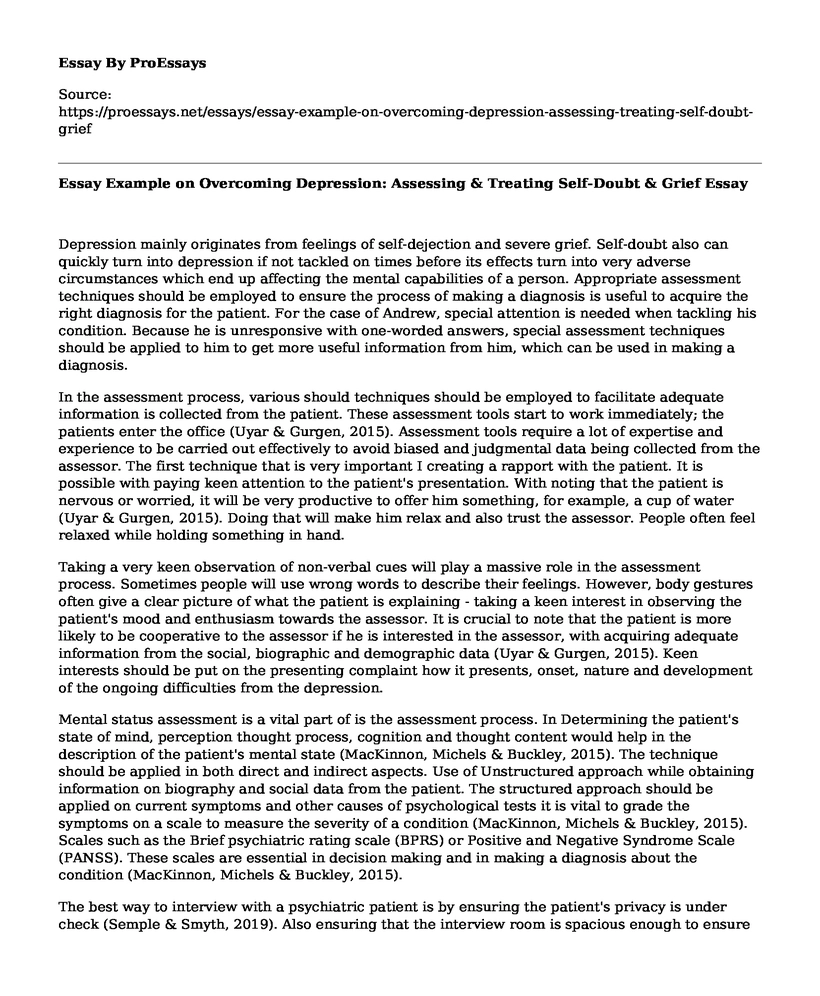Depression mainly originates from feelings of self-dejection and severe grief. Self-doubt also can quickly turn into depression if not tackled on times before its effects turn into very adverse circumstances which end up affecting the mental capabilities of a person. Appropriate assessment techniques should be employed to ensure the process of making a diagnosis is useful to acquire the right diagnosis for the patient. For the case of Andrew, special attention is needed when tackling his condition. Because he is unresponsive with one-worded answers, special assessment techniques should be applied to him to get more useful information from him, which can be used in making a diagnosis.
In the assessment process, various should techniques should be employed to facilitate adequate information is collected from the patient. These assessment tools start to work immediately; the patients enter the office (Uyar & Gurgen, 2015). Assessment tools require a lot of expertise and experience to be carried out effectively to avoid biased and judgmental data being collected from the assessor. The first technique that is very important I creating a rapport with the patient. It is possible with paying keen attention to the patient's presentation. With noting that the patient is nervous or worried, it will be very productive to offer him something, for example, a cup of water (Uyar & Gurgen, 2015). Doing that will make him relax and also trust the assessor. People often feel relaxed while holding something in hand.
Taking a very keen observation of non-verbal cues will play a massive role in the assessment process. Sometimes people will use wrong words to describe their feelings. However, body gestures often give a clear picture of what the patient is explaining - taking a keen interest in observing the patient's mood and enthusiasm towards the assessor. It is crucial to note that the patient is more likely to be cooperative to the assessor if he is interested in the assessor, with acquiring adequate information from the social, biographic and demographic data (Uyar & Gurgen, 2015). Keen interests should be put on the presenting complaint how it presents, onset, nature and development of the ongoing difficulties from the depression.
Mental status assessment is a vital part of is the assessment process. In Determining the patient's state of mind, perception thought process, cognition and thought content would help in the description of the patient's mental state (MacKinnon, Michels & Buckley, 2015). The technique should be applied in both direct and indirect aspects. Use of Unstructured approach while obtaining information on biography and social data from the patient. The structured approach should be applied on current symptoms and other causes of psychological tests it is vital to grade the symptoms on a scale to measure the severity of a condition (MacKinnon, Michels & Buckley, 2015). Scales such as the Brief psychiatric rating scale (BPRS) or Positive and Negative Syndrome Scale (PANSS). These scales are essential in decision making and in making a diagnosis about the condition (MacKinnon, Michels & Buckley, 2015).
The best way to interview with a psychiatric patient is by ensuring the patient's privacy is under check (Semple & Smyth, 2019). Also ensuring that the interview room is spacious enough to ensure the comfort of the patient. With the handling of rough patients, the doctor's safety should always be prioritized to avoid unnecessary injuries during the interview process (Semple & Smyth, 2019). The doctor should always be keen on ensuring the existence of a good rapport between the doctor and the patient. Excitingly asking the questions will possibly guarantee that the patient is interested in the interview and also helps in ensuring that attention and concentration are present in the discussion (Semple & Smyth, 2019).
References
MacKinnon, R. A., Michels, R., & Buckley, P. J. (2015). The psychiatric interview in clinical practice. American Psychiatric Pub.
Semple, D., & Smyth, R. (2019). Oxford handbook of psychiatry. Oxford university press.
Uyar, B., & Gurgen, F. (2015). The Assessment of Psychiatric Consultations in a University Hospital. Journal of Clinical Psychiatry, 18(1), 24-28.
Cite this page
Essay Example on Overcoming Depression: Assessing & Treating Self-Doubt & Grief. (2023, Mar 28). Retrieved from https://proessays.net/essays/essay-example-on-overcoming-depression-assessing-treating-self-doubt-grief
If you are the original author of this essay and no longer wish to have it published on the ProEssays website, please click below to request its removal:
- Love: A Product of Free Will? Essay Sample
- Theoretical Account of Oprah Winfrey's Personality
- Strategic Plan Process in Mental Health Setting Paper Example
- Research Paper on Association Between Vaccines and Autism
- Pharmacology in Disasters and Trauma Essay Example
- Essay Example on Psychopaths: Impact on Criminal Justice Systems
- Essay Example on Child Abuse: Unveiling Causes of a Contentious Issue







